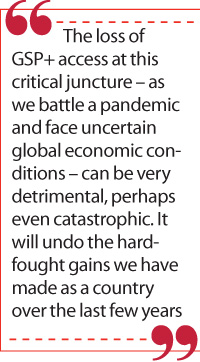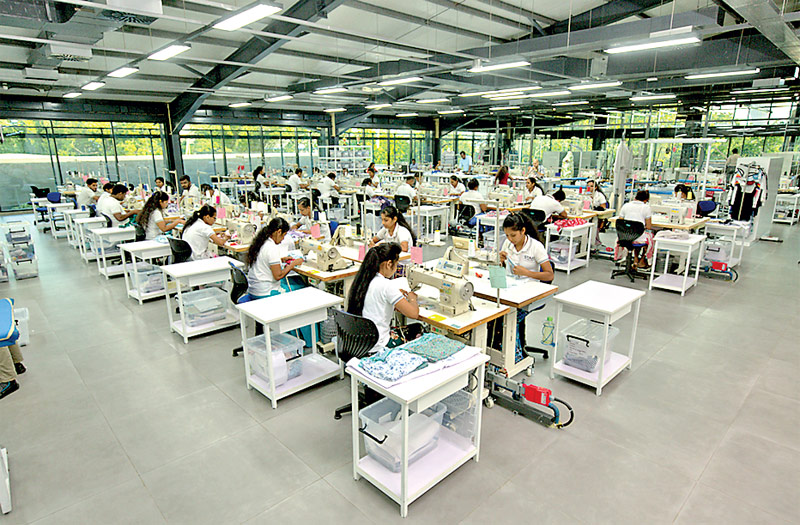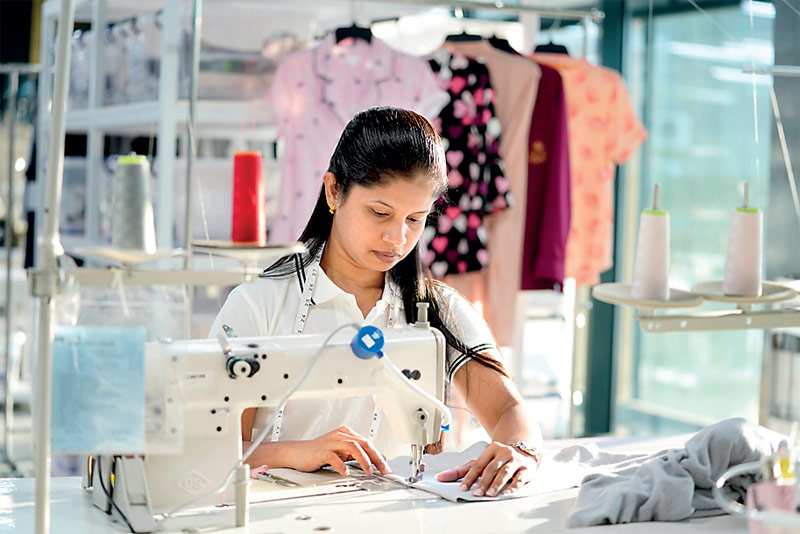Saturday Feb 14, 2026
Saturday Feb 14, 2026
Monday, 26 July 2021 00:00 - - {{hitsCtrl.values.hits}}

Merchandise exports production process
 Sri Lanka’s apparel industry – which accounts for 47% of the nation’s exports and 15% of industrial employment – is critical to our national economic health and wellbeing. Therefore, ensuring that the industry remains strong and resilient should be very high on our list of national priorities.
Sri Lanka’s apparel industry – which accounts for 47% of the nation’s exports and 15% of industrial employment – is critical to our national economic health and wellbeing. Therefore, ensuring that the industry remains strong and resilient should be very high on our list of national priorities.
Given this backdrop, managing Sri Lanka’s relationships with key trading partners becomes highly significant, especially the few that we have preferential trading relationships with. A case in point is the European Union (EU).
The Generalised System of Preferences (GSP) or GSP, a preferential tariff system of the EU, one of our main export markets, plays a key role in Sri Lanka’s export competitiveness – and in the apparel industry’s success story. We cannot afford to lose access to our second largest export market, but the risk of that happening is real.
Here’s a situational summary: the European Parliament asked the European Commission (EC) to consider suspending Sri Lanka’s GSP+ status (explained a few paragraphs below), which it had restored in 2017 after first revoking it in 2010. The EC’s decision-making processes are however, grounded in economic rationale, and different from the calculus of the European Parliament, whose considerations are primarily political.
The timing is significant; the current GSP regulations will expire on 31 December 2023, and the renewal of the scheme is under review at present. This matters for another important reason: two other markets that the Sri Lankan apparel industry hopes to enter – Japan and Australia – also have GSP schemes, modelled on the EU. The EC’s actions could – potentially – affect those plans.
There are other reasons GSP+ access needs to be protected; look at the economic benefits that the apparel industry has contributed, the jobs it has created, its impact on economic development across the country, the reduction between rural and urban incomes that it has enabled and how it has empowered women by dramatically increasing their participation in the workforce.
Apparel accounted for 59% of our country’s merchandise exports in 2020: $ 4.4 billion out of $ 7.7 billion, and just a shade under 5.5% of GDP. It employs 350,000 people directly, and roughly twice that number indirectly. Women are 78% of the industry’s employees, compared to the national average of 34% for female participation in the workforce.
A 2018 study by the data analytics and insights company Kantar found that employees in the apparel industry were proud of being part of it; women felt empowered and glad to have economic independence. Additionally, earnings of people moving from rural to urban apparel industry jobs, boosts incomes in rural Sri Lanka, reducing rural poverty substantially.
A brief explanation of what GSP is, and how it works will help understand why retaining it is important. In essence, GSP+ is a special incentive arrangement aimed at sustainable development and good governance in vulnerable, low and lower-middle income countries. Vulnerability is assessed based on a country’s imports and economic diversification.
GSP+ countries – there are seven others apart from Sri Lanka – have to implement 27 core international conventions on human rights, labour rights, protection of the environment and good governance. The EU reduces customs duties for the products under the general GSP arrangement to 0% for GSP+ countries. GSP+ benefited roughly $ 1.9 billion of Sri Lanka’s exports to EU countries in 2019.
In its 2019 annual report, the EU said apparel accounted for 48% of the 184 billion Euro under GSP+. This number highlights how vital being eligible for GSP+ is to remain competitive in accessing the European market.
Since we import a little over half the raw materials used in the apparel industry, we cannot, under current EU rules, get zero duty benefits on the full value of apparel exports to the EU, which were $ 1.2 billion in 2019. Zero duties were allowed on $ 586 million, or roughly 42%.
That’s because we use a large part of imported content in our apparel. GSP+ has conditions called ‘country of origin’ rules, whereby you can only benefit from zero duty if the product was made from fabric that originated from a SAARC country.
The upcoming fabric processing park at Eravur gains additional importance in light of this. This fabric park is a project that has been under consideration for a long time; and when completed, it will add to our raw material processing capacity and enable import substitution. The decision by the GoSL to expedite this park will be a major boost to the Sri Lankan apparel manufacturer as it will allow for a greater utilisation of GSP+. The zone will have a central wastewater treatment facility which is of significant value to investors in a fabric park.
In layman terms, at least in apparel, the loss of GSP+ would on average make Sri Lankan exports to the EU 9.5% more expensive than it is in the status quo. This ‘surcharge’ would come on the back of Sri Lankan apparel already being more ‘expensive’ than that of our competitors. 
Rather than being cost-competitive like some competitor nations, our apparel industry focuses on value addition, estimated at close to $ 2.4 billion on $ 5.3 billion of apparel exports in 2019 (after deducting costs of raw material imports), or 52%. With strategic initiatives like the fabric park in Ervaur, we can aim towards 65% value addition within Sri Lanka in the not-too-distant future. However, the viability of ventures such as the fabric park hinge on investors being able to reap the full reward presented through the existence of preferential trade agreements.
A misnomer present in society is that GSP+ is an apparel problem. Looking at the apparel industry’s GSP+ utilisation (42%) compared to other Sri Lankan exports to the EU (total $ 691 million in 2019): rubber (96%), seafood (99%), processed food (96%), tea and spices (70%), shows that other Sri Lankan exports benefit more than apparel exports, even though individual sectors may not be as large.
Retaining our GSP+ access matters for other important reasons: for one it will enable greater product diversification as companies seek to add more value and amplify greater utilisation of GSP+.
Second, projects like Eravur attract greater foreign investment. Apparel manufacturers are themselves investing in vertical integration and building innovation and technological capability that will increase value addition and enable expansion into new markets into the future. The incentive for such investment will remain as long as preferential trade agreements like GSP+ remain accessible.
Given all these benefits, the loss of GSP+ access at this critical juncture – as we battle a pandemic and face uncertain global economic conditions – can be very detrimental, perhaps even catastrophic. It will undo the hard-fought gains we have made as a country over the last few years.
From a business perspective, many thousands of small and medium enterprises – our economic backbone, in many ways – will be under severe threat. The loss of jobs will threaten livelihoods, families and communities in rural and urban Sri Lanka.
As other industries like tea, rubber and processed food lose GSP+ privileges, our export diversity will be under severe risk of volatility, exposing us to greater macro-economic vulnerability. In the short- to medium-term, per capital incomes will take a beating. There can be a possibly irreversible trade shift to other countries in the region.
Some people believe we don’t really need GSP+. Unfortunately, global trade does not take place on a level playing field. Market access is governed by a rulebook that includes free trade agreements (FTAs) and export schemes like Everything But Arms (EBA) concessions, among others.
Asia is where nearly 65% of global apparel manufacturing is. It includes giants, from China and India, to agile countries like Vietnam, cost-competitive players like Bangladesh and Pakistan, and sourcing countries like Malaysia and Indonesia. Studies indicate that for the next two decades, Asia will remain dominant in apparel manufacturing. Amidst this strong competition, Sri Lanka cannot afford to lose the few advantages it has.
Losing GSP+ in the apparel context is not about ‘thinning’ margins. Losing GSP+ is about wiping out razor thin margins, turning them negative, and eliminating access to Sri Lanka’s second largest export market.
Why? Because losing GSP+ would make Sri Lankan exports 9.5% more expensive (on average) than that of its peers. In an environment where our closest competitors like Bangladesh, Cambodia, Pakistan, and Vietnam are entitled to either GSP+ or other preferential trade agreements, losing GSP+ would quite simply make Sri Lanka compete on an uneven playing field.
In early July this year, the media quoted the Foreign Ministry as saying that the authorities have begun discussions with the EU on the GSP+ review. Government officials said they were willing to sit down with EU officials and report on the progress in implementing the conditions on which the GSP+ restoration was contingent. Proactive measures of this nature to preserve trade agreements the country has in place, will only serve to strengthen investor confidence and equip Sri Lanka’s export industries that rely on EU access to grow from strength to strength.
In this environment, Sri Lanka will chart its own path. Our technological prowess is growing, our ethical manufacturing, sourcing and sustainable manufacturing practices are global best practices. Our apparel will be the preferred choice of consumers in Europe, the United States, and the rest of the world.
We are investing in innovative manufacturing, in fabric technology, and in R&D to develop these technologies. Right now, however, the Government must do everything in its power to retain GSP+ concessions.
By retaining GSP+ access, we gain the time and resources to help build and strengthen the capacities that will make us self-reliant in most of the supply chain, from raw materials to design. GSP+ will keep us on track to getting there, while staying strong and resilient in our core markets.

Garment production lines at Star Garments

An apparel worker at Star Garments
(The writer currently serves as the treasurer of the Sri Lanka Apparel Exporters Association (SLAEA). An industry veteran, he is the senior manager of Star Fashion Clothing which is an affiliate of Star Fashion group, where he is also a director. An alumnus of the University of Notre Dame, he holds a BBA and MSc in Accountancy.)